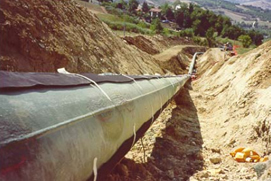This Spanish technology uses fiber optic cable which acts as a sensor, providing real time monitoring of pipelines that transport crude oil.
There are more than 4,000 kilometers of pipelines on Spanish soil which are used to transport over 35 million cubic meters of crude oil and petroleum products every year, according to a report from the CLH Group (the largest transportation and storage company in the country for such products.)
Every oil pipeline used for transport must have a control system in order to rapidly detect leaks and guaranty safety while reducing any adverse environmental impact. Focus, a spin off from Spain’s National Research Council (CSIC), has developed technology that monitors these pipelines in order to detect fuel leaks in real time with a two meter margin of error.
This system is based on fiber optic cable, which is distributed along the exterior of the entire pipeline system and acts as a sensor. A measurement device monitors each 100 kilometer stretch of cable, collecting data every six minutes. In this manner any malfunction can be detected immediately; this is in contrast to the vast majority of pipeline monitoring methods used today where, for example, it is often impossible to know how long a leak has existed after it has been identified.
Fiber optic cable also detects sounds, which is very useful for identifying system failures produced, for example, by excavation equipment. In addition, the cables monitoring a pipeline network can detect abnormal increases in temperature, which are often associated with crude oil leaks.
This technology developed by Focus requires a smaller up-front investment compared to traditional systems and can be used for pipeline systems transporting gas and water, or even for natural currents such as rivers and the sea.
